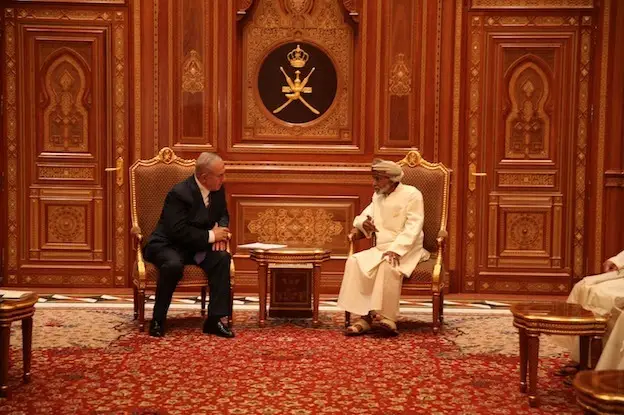Israel-Oman Relations
Israel-Oman Relations
 |
Oman has no official diplomatic ties with Israel. Following the signing of the Oslo Accords, however, relations with several of the Gulf states improved, some more overtly than others. Yitzhak Rabin was the first prime minister to visit Oman in 1994. Oman’s foreign minister visited Israel in 1995.
In 1996, Shimon Peres met with the sultan. The same year, the two countries agreed to open trade representative offices. Israel opened one, but Oman never did. Following the collapse of the Oslo negotiations at the end of the 1990s, relations cooled again, and Oman shut the Israeli office in 2000.
Israel did quietly maintain contacts with Oman. Foreign Minister Tzipi Livni, for example, met with her Omani counterpart in 2008. Israeli scientists also cooperated with Oman on desalination techniques.
In a surprise announcement, the government reported that Prime Minister Benjamin Netanyahu made an official visit to Oman and met with Sultan Qaboos Bin Said on October 26, 2018.
The Prime Minister’s Office said the two sides discussed ways to achieve “peace and stability in the Middle East,” adding that “the prime minister’s visit is a significant step in implementing the policy outlined by Prime Minister Netanyahu on deepening relations with the states of the region while leveraging Israel’s advantages in security, technology and economic matters." In another positive sign, Netanyahu later announced Oman would open its airspace to El Al. That did not happen and, ironically, relations took a turn for the worse after the Abraham Accords were signed in 2020.
While there was some hope that Oman might join the Accords, the government became more hostile after Sultan Qaboos died and his cousin Haitham Bin Tariq assumed power. At the end of 2022, the country’s parliament voted to criminalize any relations or interactions with “the Zionist entity.”
“The last thing Muscat wants is for the Gulf to become a battlefield with attacks on western shipping, resulting in the closure of the Straits of Hormuz,” said British journalist Tom Gross. “Oman, like Qatar, is trying to calm Iran. Their message is: ‘We are not the ones rushing to form relations with Israel so don’t take it out on us.’”
In a reversal, however, Oman agreed in February 2023 to allow Israeli airlines to fly over Omani airspace, reducing flight times to Asia, making lowering fares possible, and creating opportunities to fly to further destinations such as Australia. The government’s earlier refusal to permit flights forced Israeli flights to bypass the Arabian peninsula even though Saudi Arabia had agreed to permit them to use its airspace.
Apparently helped by American diplomacy, Israel’s Foreign Minister Eli Cohen called the decision “historic.”
Sources: Simon Henderson, “Israel-GCC Ties Twenty-Five Years After the First Gulf War,” inFocus Quarterly, (Fall 2015).
Noa Landau and Jack Khoury, “Netanyahu Visits Oman, Which Has No Diplomatic Ties With Israel,” Haaretz, (October 26, 2018).
“Israel Says Oman Will Open Its Airspace to Israeli Carrier,” Associated Press, (December 10, 2018).
David I. Klein, “Oman, once thought to be next Abraham Accords signer, criminalizes relations with Israel,” JTA, (January 4, 2023).
Jonathan Lis, “Oman Allows Israeli Flights Into Airspace, FM Praises ‘Historic Decision,’” Haaretz, (February 23, 2023).


